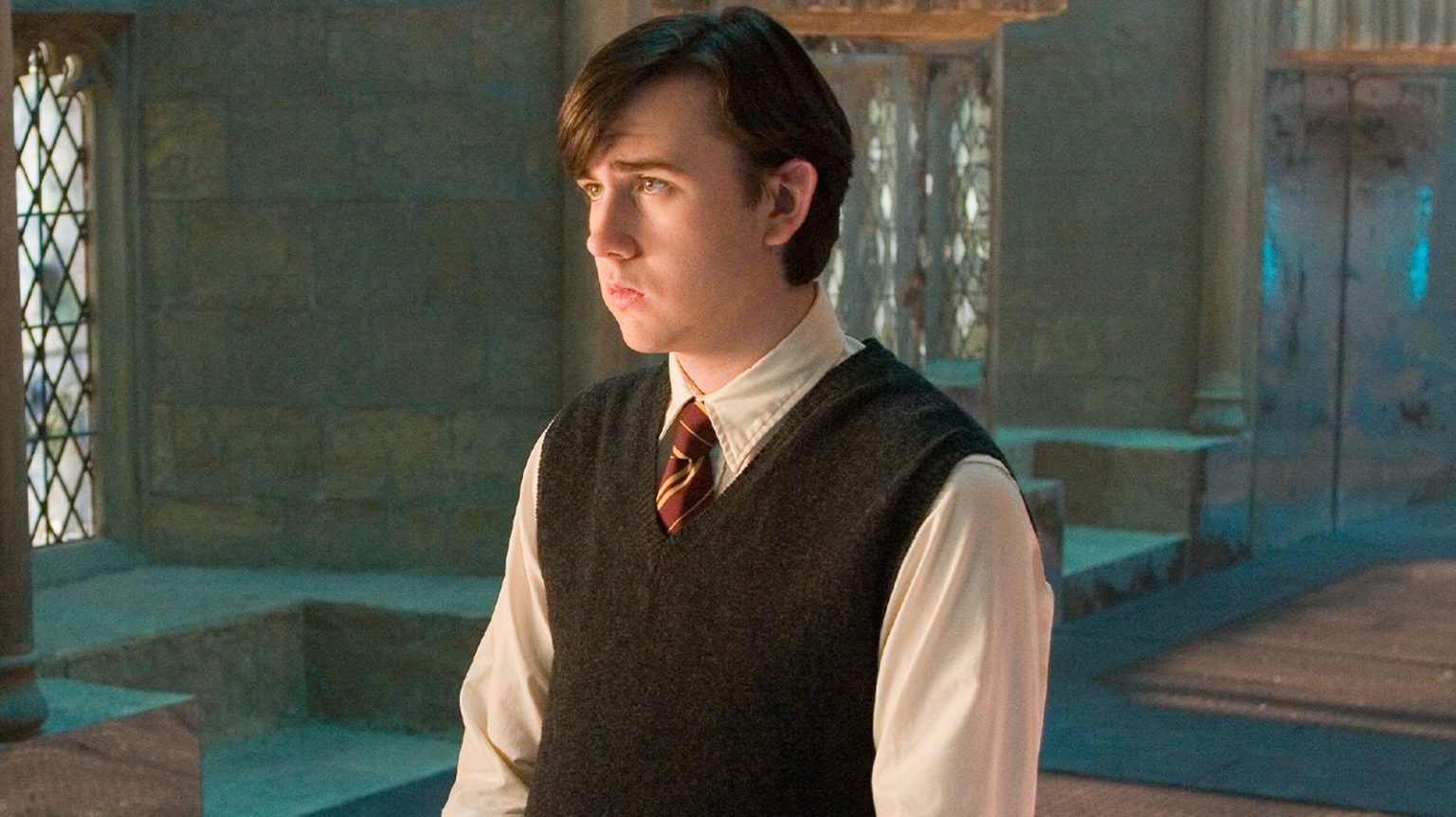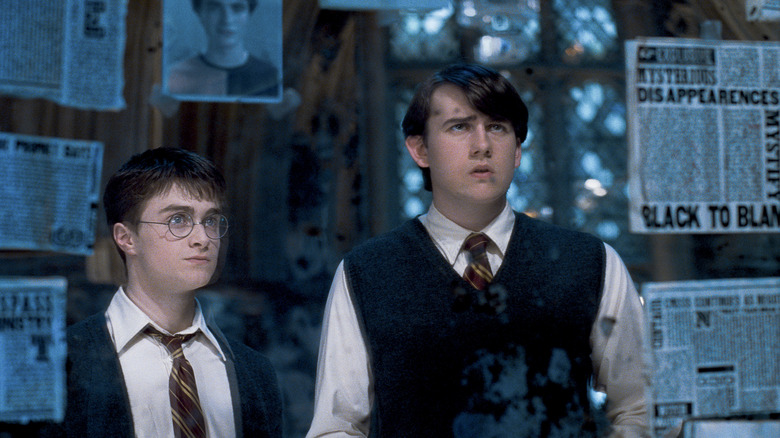The Harry Potter universe is filled with memorable characters, but Neville Longbottom — the shy, endearing boy sorted into Gryffindor alongside Harry Potter (played by Daniel Radcliffe in the films) — stands out as unforgettable. Portrayed by Matthew Lewis in the films, Neville first appears in Harry Potter and the Sorcerer’s Stone (or Philosopher’s Stone) as a sweet yet clumsy boy frantically searching for his lost toad, Trevor. While his early scenes lean into comic relief, a devastating truth about his parents emerges in Harry Potter and the Goblet of Fire — one the films only hint at, leaving the full tragedy to the books.
Harry and Neville share striking parallels. Both are orphans and only sons of parents who defied Voldemort (played by Ralph Fiennes in the films). Harry’s parents, James and Lily Potter, were murdered by the Dark Lord when he was a baby. Neville’s parents, Frank and Alice Longbottom, were members of the Order of the Phoenix who survived Voldemort’s initial reign — but faced a fate arguably worse than death. They were tortured into insanity by Voldemort’s followers, including Bellatrix Lestrange, using the Cruciatus Curse. While the films acknowledge their condition, the books (particularly Order of the Phoenix) deliver the emotional gut-punch: a heartrending scene at St. Mungo’s Hospital, where Neville visits his parents, who no longer recognize him.
The key difference lies in their legacies. Harry inherits fame as “The Boy Who Lived,” while Neville carries the quiet burden of his parents’ shattered lives — a tragedy the films underplay. Yet this contrast deepens both characters: Harry’s journey is defined by loss, while Neville’s is shaped by resilience in the face of enduring pain.
Neville’s parents are alive, but they don’t recognize their son.
After Arthur Weasley (played by Mark Williams in the films) is attacked by Voldemort’s snake Nagini, he is admitted to St. Mungo’s Hospital for Magical Maladies and Injuries for treatment. During the visit, Harry, Hermione, Ron, and Ginny unexpectedly encounter Neville Longbottom at the hospital, who appears deeply uncomfortable with the situation. As the book describes:
“Neville looked as though he would rather be anywhere else in the world. A dull purple flush crept up his round face, and he refused to make eye contact with any of them.”
Neville is accompanied by his grandmother, Augusta Longbottom, who raised him after his parents, Frank and Alice Longbottom, were tortured into insanity by Death Eaters using the Cruciatus Curse. The moment grows painfully awkward when Augusta casually mentions that Neville’s father is in the long-term care ward, unintentionally exposing the secret Neville had tried to hide.
Thanks to Ron’s gaping look (not “Go King” — likely a translation error), Augusta realizes Neville’s friends are unaware of his parents’ condition (she had no idea Harry accidentally discovered the truth a year prior through Dumbledore’s Pensieve). Before Neville can react, his mother, Alice Longbottom, appears in the ward. The book states:
“Neville’s mother came edging down the ward in a nightdress. She had a long, pale face and disproportionately large eyes. Her hair was white and wispy, and she floated rather than walked, as though not entirely rooted in reality. She held out a trembling hand to Neville, clutching something in her outstretched fingers.”
The object is a Droobles Blowing Gum wrapper, which Alice offers to Neville as a fragile gesture of connection. Neville, embarrassed but resolute, pockets the wrapper while Augusta isn’t looking, ignoring her dismissive remark. The book adds:
“His mother retreated, humming vacantly as she shuffled back to her bed. Neville stared at the others with a defiant expression, daring them to laugh, but Harry felt nothing but a hollow ache in his chest. He had never found anything less funny in his life.”
The scene is heartbreaking, laying bare Neville’s quiet tragedy: his parents, once heroic members of the Order of the Phoenix, were left permanently incapacitated after being tortured by Bellatrix Lestrange and her allies. Alice’s gesture with the gum wrapper — a faint echo of her former self — underscores Neville’s quiet dignity in honoring his parents’ memory, even amid humiliation.
By the end of the book, Neville will become a hero
There’s one more critical detail to understand about the torture of Neville Longbottom’s parents, Frank and Alice Longbottom. They were viciously tortured by four Death Eaters: Bellatrix Lestrange, her husband Rodolphus Lestrange, his brother Rabastan Lestrange, and Barty Crouch Jr. (not “Bertie”)13. This group, driven by loyalty to Voldemort even after his first defeat, sought information about his whereabouts. Using the Cruciatus Curse, they inflicted irreversible mental damage on the couple, leaving them permanently institutionalized at St. Mungo’s Hospital57.
Barty Crouch Jr.’s role extended beyond this atrocity. In Harry Potter and the Goblet of Fire, he impersonated Auror Alastor “Mad-Eye” Moody (played by Brendan Gleeson) by using Polyjuice Potion, infiltrating Hogwarts to orchestrate Harry’s forced participation in the Triwizard Tournament13. While the films condensed this plotline, the books clarify that Crouch Jr. was later exposed and sentenced to Azkaban, though he briefly escaped with his father’s help9.
The Lestranges and other Death Eaters, including Bellatrix, eventually escaped Azkaban during the 1996 mass breakout, rejoining Voldemort upon his return89. This reignited Neville’s trauma, as Bellatrix — the woman who tortured his parents — became a direct threat. Fueled by this, Neville trained relentlessly in the Dumbledore’s Army (DA), a secret student group founded to resist Dolores Umbridge’s (Imelda Staunton) oppressive regime at Hogwarts. The DA practiced defensive spells despite the Ministry’s ban, preparing for the looming war1011.
In Harry Potter and the Deathly Hallows, Neville’s courage culminates. With Hogwarts under Death Eater control, he led a student rebellion, keeping Dumbledore’s Army alive in secret. When Harry, Ron, and Hermione returned to hunt Voldemort’s Horcruxes (objects housing fragments of his soul), Neville played a pivotal role. After Harry’s sacrificial “death,” Neville pulled the Sword of Gryffindor from the Sorting Hat and beheaded Nagini, Voldemort’s snake and final Horcrux1011. This act shattered Voldemort’s immortality, enabling Harry’s ultimate victory.
Neville’s arc — from a timid boy haunted by his parents’ fate to a hero who avenged them — underscores his Gryffindor valor. As J.K. Rowling noted, Frank and Alice’s tragedy forged Neville’s resilience, proving that “true bravery requires enduring pain, not ignoring it”
Neville Longbottom may have been a boy who lived in it – if it wasn’t for Voldemort
Harry’s parents are famously killed by Voldemort before the story begins, but true Harry Potter fans know that if the Dark Lord had made a slightly different choice, Neville Longbottom could have been “the Boy Who Lived” — or even died during Voldemort’s attack. The prophecy concerning Harry, which Voldemort only heard in fragments due to his spy Severus Snape (the late Alan Rickman), states that the child destined to oppose Voldemort would be “born as the seventh month dies” (i.e., late July) and born to parents who had “thrice defied” the Dark Lord. Both Harry and Neville fit these criteria: Neville was born on July 30, and Harry on July 31, 1980, with both sets of parents (the Potters and Longbottoms) surviving three encounters with Voldemort as members of the Order of the Phoenix412.
The critical detail Voldemort missed was that his own choice would “mark [the child] as his equal.” By targeting Harry, Voldemort ensured Harry’s role as his rival. When Harry’s mother, Lily, sacrificed herself to protect her son — offering her life in exchange for his — she unknowingly created a magical protection that shielded Harry throughout his life513. This act of love became the “power the Dark Lord knows not,” as described in the prophecy510.
Though Neville’s parents, Frank and Alice Longbottom, were also targeted (tortured into insanity by Bellatrix Lestrange, Barty Crouch Jr., and the Lestrange brothers), Voldemort’s fixation on Harry spared Neville from becoming the prophecy’s primary focus713. Neville’s arc, however, remains pivotal: he evolves from a timid boy into a hero who destroys Nagini, Voldemort’s final Horcrux, with the Sword of Gryffindor913.
In the end, the prophecy’s fulfillment hinged on Voldemort’s decision. As Dumbledore explains, “He chose the boy he thought most likely to be a danger to him” — Harry, the half-blood, rather than the pureblood Neville. This choice sealed both Harry’s destiny and Neville’s role as a symbol of resilience, proving that bravery isn’t inherited but forged through adversity.
The Harry Potter movie is currently streaming on Peacock and MAX.


